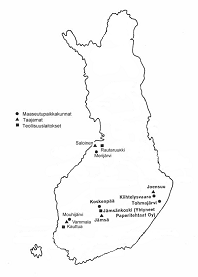Population survey data - summary
The surveys
Finnish Mobile Clinic Health Examination Survey (AK)
The purpose of the Finnish Mobile Clinic Health Examination Survey (FMC) was to carry through early detection of illnesses with surveys and to serve health related research. In 1966-1972 a total of 62440 adults from 31 municipalities from different parts of the country were invited to the study.

Altogether 51 522 (82.5 %) of them participated. Initially the interests of the baseline of the FMC were lung diseases, heart problems, anemia and iron deficiency, diabetes, the diseases of the kidneys and urinary tract, thyroid gland diseases, calcium metabolism related diseases and coronary artery disease. During the follow-up, the variety of diseases of interest has diversified remarkably.
Finnish Mobile Clinic Follow-up Survey (AU)
The purpose of the follow-up stage of the Finnish Mobile Clinic, carried out in 1973-1976, was to investigate prevalence, incidence, determinants, and changes in the determinants of certain national diseases and more generally to serve research related to health. Additionally, the purpose was to study the importance of screening and early detection of diseases. Every third person who was invited to the FMC, altogether 24 833 individuals from 12 municipalities, were invited to the follow-up survey.

Out of them 19 518 (78.6%) participated in the examination. The study objects were coronary artery disease, hypertension and some other cardiovascular diseases, diabetes, disorders of lipid metabolism, diseases of kidney and urinary tract, thyroid gland diseases, pulmonary tuberculosis and other lung diseases, and anemia and polycythemia. As it was the case with the FMC, the variety of diseases of interest has diversified substantially.
Finnish Mobile Clinic Breast Cancer Screening Experiment (RI)
The Finnish Mobile Clinic carried out a breast cancer screening experiment in 10 municipalities in northern Finland during the years 1969-1972.

A total of 20 908 women, 30 years or more of age, were invited to the study. Out of them 17 561 (84.0%) participated. The purpose of the study was to examine the suitability of breast cancer screening methods and a mobile investigation unit for a population survey. Further aims were to compare clinical research, mammography and thermography as a breast cancer screening method, and to create preconditions to investigate certain breast cancer risk factors and the incidence of breast cancer.
Mini-Finland Health Survey (MF)
The Mini-Finland Health Survey (MF), carried in 1978-1980, was in Europe the first comprehensive health examination survey representing the whole country. It was meant as the baseline for the Finnish national health follow-up system, based on which the national health can be followed and its development can be predicted. In the MF, traditions and know-how from the FMC and the health security interviews from the years 1963, 1968 and 1976 were combined in a representative sample of the Finnish population. The aim of the study was to achieve reliable, up-to-date and broad information about population health, functional capacity and need for treatment, and the sufficiency of the services, to develop measurement and follow-up methods, to achieve comparative information and reference values, and to develop a diversified health examination. The purpose was also to compare the pictures given by the health interview and the health examination about the population health and need for treatment. Additionally, the goal was early detection of diseases and instruction for treatment and collection of data for epidemiological research concerning determinants of the population health. The objects of the study were the general national diseases and the deficiencies of functional capacity and their risk factors. Totally 8000 adults, aged 30 years or over (3637 men and 4363 women) from 40 municipalities, were included in the two-phase cluster sample of the Mini-Finland Survey. A total of 7703 persons participated (3,498 men and 4,205 women), which is 96.3% of the sample, in the home visit interview, made at the beginning of the field survey. There were 7217 persons (3322 men and 3895 women), which is 90.2% of the sample, that participated in the health examination.

Other Mini-Finland-substudies
Alongside the actual Mini-Finland Health Survey, a similar control sample was created for the later assessment of whether the health examination had had impact on the health of those that participated in the Mini-Finland Health Survey.
As a part of the follow-up of the Mini-Finland Health Survey, 1270 participants were invited to the Health 2000 and the Health 2011 Surveys. Of those invited, 1130 participated in the Health 2000 Survey and 750 in the Health 2011 survey. A total of 723 persons participated in all three surveys.
Mini-Finland follow-up sample- table (PDF 8kb)
Health 2000 and Health 2011 Surveys
The following steps of the national health follow-up were the Health 2000 Survey, done during the years 2000-2001 and the Health 2011, done during the years 2011-2012. Both surveys were based on a representative sample of population aged 18 or over. The methods for the participants over 30 years were mainly the same as in the Mini-Finland Health Survey. Based on the surveys, up-to-date information was achieved about the most important national diseases, their causes and treatment, and functional capacity and work ability. Based on this data, the development of health and functional capacity can validly be estimated. Combining these with the results of the Mini-Finland Survey gives follow-up information on the population health during 20-30 years.



